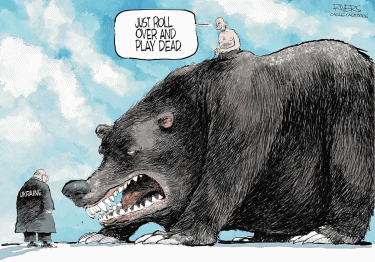Says Navy War College Professor James Holmes:
Which antagonist—if either—will prevail in Ukraine?
The longevity and success of Russia’s offensive is a hot topic of debate among foreign-policy practitioners and the commentariat. Nor is it an idle topic. But beware of too-confident assessments. Canvassing military history indicates that campaigns tend to sputter over time. A campaign may stagnate, and reversals of fortune are far from rare. It takes not just a proficient military machine but leadership possessed of ingenuity and force of character to keep the momentum going, or regain it if it slips way.
So Russia isn’t predestined to be the victor over Ukraine even though it’s the stronger combatant—by far—by the numbers. Indeed, the Russian offensive has shown signs of faltering since day one. A lesser combatant that makes maximum use of its latent combat power can stymie an opponent that wastes its potential.
Ukraine has a chance.
Martial sage Carl von Clausewitz explains the rhythms of the battlefield in somewhat mystical terms, showing how military success relates to and helps bring about political success. The central idea he puts forward is the “culminating point,” the point at which the fortunes of war start to change for one or both combatants, sometimes in drastic ways. One antagonist’s relative strength may top out while the other’s bottoms out and starts to rebound. Or they may come to a crossover point beyond which the erstwhile stronger competitor is now the weaker.
First, there’s the “culminating point of victory.” Clausewitz posits that the attacker amasses initial supremacy in the military balance by virtue of surprise, the initiative, the prerogative to choose the initial point of impact, and so forth. At the same time, though, Clausewitz believes tactical defense is the strongest form of warfare. That being the case, he prophesies that the attacker’s military advantage will crest and start to dwindle over time. But because political advantage—bargaining leverage that goes to the likely victor—starts to ebb away after the culminating point, so does the attacker’s ability to impose its will on the defender.
Call it the Clausewitzian paradox. The attacker generally has to press its offensive beyond the culminating point of victory—its maximum margin of military superiority—to seize what it wants. But it’s in a weaker and weaker position as the offensive goes on. It takes masterful generalship to sustain the battlefield advantage long enough to pluck the fruits of war.
Politically speaking, Russia may already have culminated. Its failure to score the lightning triumph craved by President Vladimir Putin has stained Russia’s reputation for martial prowess. Fewer foreign leaders will fear Moscow’s threats in the future, or seek out support from what seems like an untrustworthy ally. Repute is everything in power politics, and Russia has damaged its brand.
Through its unprovoked assault, moreover, Russia stands revealed as a foe of small sovereign states everywhere, and as an unworthy steward of the U.N.-led world order put in place at San Francisco in 1945. It has outdone China for lawlessness, which is saying something nowadays. Russian arms may yet prevail in Ukraine by brute force. But Russia’s political standing has suffered—making lasting political gains elusive.
There is no doubt whatsoever that Ukraine has succeeded in winning enormous international sympathy and support, causing Russia enormous economic harm, and even more importantly delegitimating its regime and making Russia into an outcast, outlaw state.
The Ukrainian defense which has held off tenfold superior Russian forces for over three weeks has also effectively destroyed Russia’s standing as a potential conventional war combatant. If this was Russia’s best, Russia versus NATO would be a complete turkey shoot. No doubt, defense analysts all over the West are thinking: If this was the Russian Army and the Russia Air Force in action, is it possible that Russia’s Strategic Forces are also a vastly-over-rated Potemkin-village fraud?






Steve (retired/recovering lawyer)
“Turkey shoot”? Really? How does one possibly come to this conclusion when describing an adversary that has, and would undoubtedly use, 6,000 nuclear warheads? This is not by any means comparable to the original “Turkey Shoot,” in which an overwhelmingly superior military force (i.e., the USA) destroyed another military force composed of second-rate personnel and equipment (because the first line pilots had mostly been killed by that time, and the vaunted Mitsubishi A6M was on the verge of obsolescence. Any confrontation between USA/NATO and Russia would soon go nuclear and then, we’re all the “turkeys” in the “shoot.” Had Japan possessed the nuclear armament currently possessed by Russia, there would have been no hesitation in its use. Thankfully, that was not the case.
McChuck
“delegitimating its regime and making Russia into an outcast, outlaw state.”
Bwahahahahaha – wheeze – hahahahaha!
McChuck
Every day, the news (which lied about every single thing for the past 20 years, but is obviously telling the truth now) tells us how the Ukrainians are defeating the Russians.
And every day, the map shows Russia gaining more ground.
JDZ
You’re not looking right. Russian gains versus objectives are pathetic, especially considering Russia’s immense advantages in infantry, artillery, and aircraft.
JDZ
The decision to escalate from conventional warfare to nuclear apocalypse would be a difficult one, even for Russia. And, at this point, one wonders how many of their missiles and bombs would actually work.
JDZ
Putin looks pretty seriously delegitimated to me.
Please Leave a Comment!